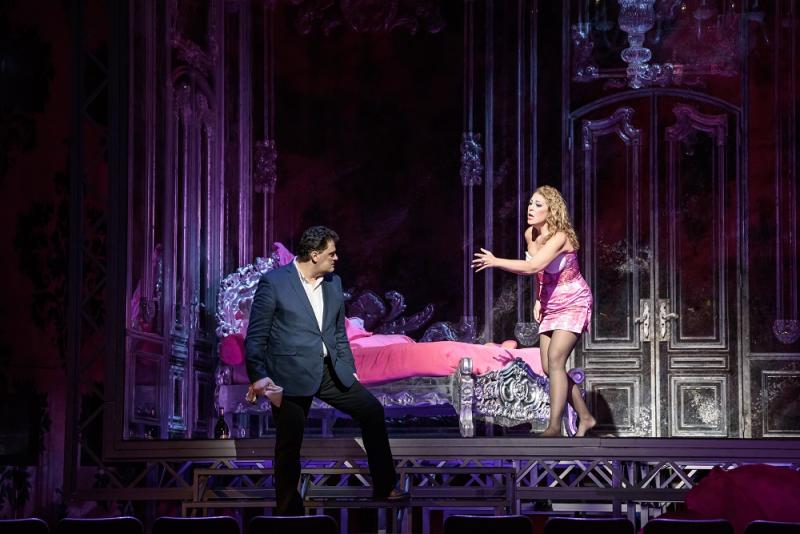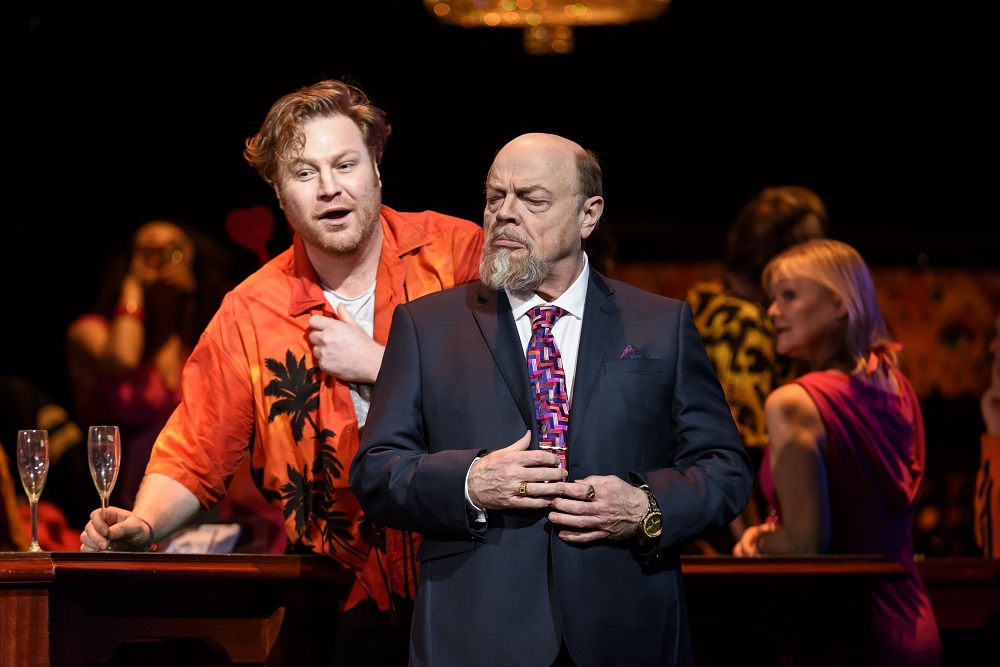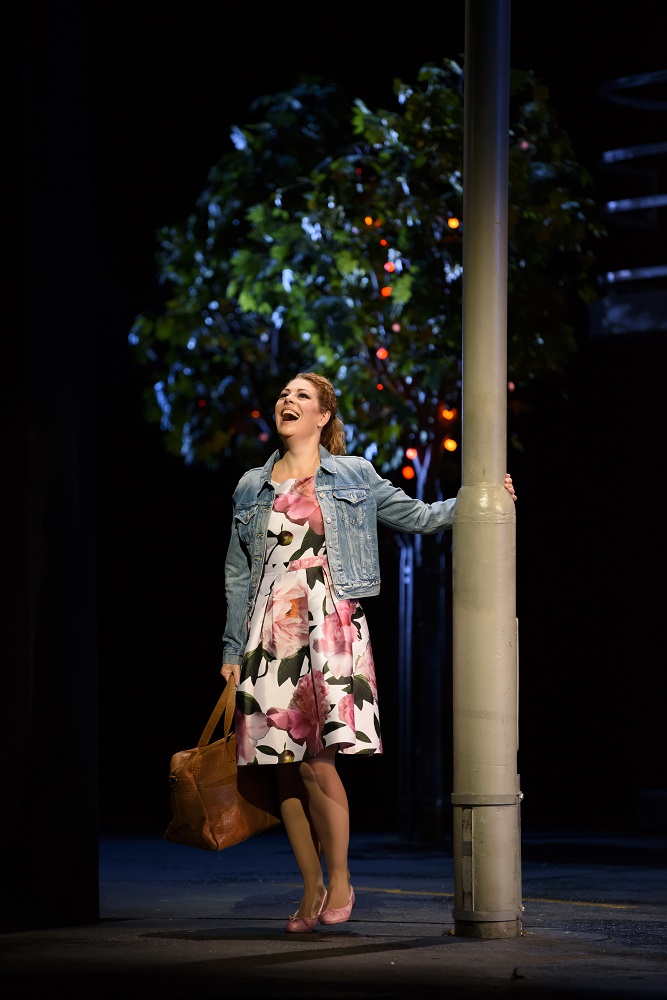Manon Lescaut, Royal Opera | reviews, news & interviews
Manon Lescaut, Royal Opera
Manon Lescaut, Royal Opera
A strong revival cast, but the staging still won’t gel

Jonathan Kent’s Manon Lescaut is back for a first revival at Covent Garden. It’s a gaudy affair, and seems calculated to provoke. But there are some interesting ideas here, and the musical standards remain high, even from the lesser-known names of this second-run cast.
Kent has taken on the laudable task of updating the opera, moving the action away from its 18th century setting to find contemporary resonances. But there are big problems: no one sends their daughters to convents any more, and all the elopements and sexual proclivities, while they might raise eyebrows today, wouldn’t shock in the way the story requires. Kent’s solution is to add a helping of voyeurism into the mix. In the second act, Manon makes a porno, watched by an audience of dirty old men, and the third act plays out as a reality TV show. The idea, it seems, is to turn everything round to the audience, to ask viewers what’s in it for them. It’s a neat trick, but there is little subtlety here, and the concept becomes a distraction – especially since Puccini trains the narrative squarely on the two lovers at its centre. Moving the attention away loses the focus, and with it the emotional engagement.
 When this production was first staged, in 2014, the lead roles were taken by Kristīne Opolais, Jonas Kaufmann and Christopher Maltman. Those are tough acts to follow, but the revival cast (here directed by Paul Higgins) is a good one, working well as an ensemble, and with all the main singers up to the vocal challenges. The best performance, both musically and dramatically, is from Levente Molnár as Lescaut (pictured above with Eric Halfvarson as Geronte). His is a smooth, broad baritone, perfectly Italianate (though he’s Hungarian), easy on the ear but with plenty of emotion. And dramatically, there is a sense of realism about his expressions and reactions that often saves the moment as the visuals descend into absurdity. The second act has the most garish of Paul Brown’s sets, with Manon’s boudoir a full-sized Rococo room – mouldings, door fittings and all – but in transparent Perspex and positioned high above the stage. Not a promising start, but the early arrival of the Molnár as Lescaut brings instant engagement, and an essential, if slender, thread of credibility.
When this production was first staged, in 2014, the lead roles were taken by Kristīne Opolais, Jonas Kaufmann and Christopher Maltman. Those are tough acts to follow, but the revival cast (here directed by Paul Higgins) is a good one, working well as an ensemble, and with all the main singers up to the vocal challenges. The best performance, both musically and dramatically, is from Levente Molnár as Lescaut (pictured above with Eric Halfvarson as Geronte). His is a smooth, broad baritone, perfectly Italianate (though he’s Hungarian), easy on the ear but with plenty of emotion. And dramatically, there is a sense of realism about his expressions and reactions that often saves the moment as the visuals descend into absurdity. The second act has the most garish of Paul Brown’s sets, with Manon’s boudoir a full-sized Rococo room – mouldings, door fittings and all – but in transparent Perspex and positioned high above the stage. Not a promising start, but the early arrival of the Molnár as Lescaut brings instant engagement, and an essential, if slender, thread of credibility.
 Sondra Radvanovsky is a real find for Manon (pictured right), with impressive vocal projection and tonal support. Dramatically, she is up against the production itself in the second and third acts, but in the fourth, which takes place on a crumbling road flyover, the director has little choice but to hand the reins over to her. It’s a long and painful death scene, but Radvanovsky makes it compelling. Her Des Grieux, Aleksandrs Antonenko, gives her all the support she needs here, though he’s not an ideal romantic lead. His voice is big, but husky and angular. And, again, he is not really helped by the production – the opera needs him as the focus of attention in the opening scenes, but instead we are distracted by the garishly-clad chorus and Manon and Geronte’s incongruous entrance in a (Renault, I think) people carrier. Antonenko is proficient, but he can’t compete, though he holds the stage better when the distractions recede. Eric Halfvarson is well cast as Geronte, all the more sinister for his diminutive stature, and old enough to be credible. An excellent voice too, although slightly strained by the second-act finale.
Sondra Radvanovsky is a real find for Manon (pictured right), with impressive vocal projection and tonal support. Dramatically, she is up against the production itself in the second and third acts, but in the fourth, which takes place on a crumbling road flyover, the director has little choice but to hand the reins over to her. It’s a long and painful death scene, but Radvanovsky makes it compelling. Her Des Grieux, Aleksandrs Antonenko, gives her all the support she needs here, though he’s not an ideal romantic lead. His voice is big, but husky and angular. And, again, he is not really helped by the production – the opera needs him as the focus of attention in the opening scenes, but instead we are distracted by the garishly-clad chorus and Manon and Geronte’s incongruous entrance in a (Renault, I think) people carrier. Antonenko is proficient, but he can’t compete, though he holds the stage better when the distractions recede. Eric Halfvarson is well cast as Geronte, all the more sinister for his diminutive stature, and old enough to be credible. An excellent voice too, although slightly strained by the second-act finale.
Antonio Pappano is in his element, and inspires the orchestra to some very fine playing, especially in the vibrant overture and the sumptuous Intermezzo. His feeling for the pace of the drama is ideal; propulsive, but with plenty of detail and poise. Excellent communication too between conductor and cast, another plus for this ensemble reading. All round, this is a musical performance characterised by power, focus and nuance – but it only serves to highlight how those qualities are lacking in the production itself.
rating
Explore topics
Share this article
The future of Arts Journalism
You can stop theartsdesk.com closing!
We urgently need financing to survive. Our fundraising drive has thus far raised £49,000 but we need to reach £100,000 or we will be forced to close. Please contribute here: https://gofund.me/c3f6033d
And if you can forward this information to anyone who might assist, we’d be grateful.

Subscribe to theartsdesk.com
Thank you for continuing to read our work on theartsdesk.com. For unlimited access to every article in its entirety, including our archive of more than 15,000 pieces, we're asking for £5 per month or £40 per year. We feel it's a very good deal, and hope you do too.
To take a subscription now simply click here.
And if you're looking for that extra gift for a friend or family member, why not treat them to a theartsdesk.com gift subscription?
more Opera
 Tosca, Welsh National Opera review - a great company reduced to brilliance
The old warhorse made special by the basics
Tosca, Welsh National Opera review - a great company reduced to brilliance
The old warhorse made special by the basics
 BBC Proms: The Marriage of Figaro, Glyndebourne Festival review - merriment and menace
Strong Proms transfer for a robust and affecting show
BBC Proms: The Marriage of Figaro, Glyndebourne Festival review - merriment and menace
Strong Proms transfer for a robust and affecting show
 BBC Proms: Suor Angelica, LSO, Pappano review - earthly passion, heavenly grief
A Sister to remember blesses Puccini's convent tragedy
BBC Proms: Suor Angelica, LSO, Pappano review - earthly passion, heavenly grief
A Sister to remember blesses Puccini's convent tragedy
 Orpheus and Eurydice, Opera Queensland/SCO, Edinburgh International Festival 2025 review - dazzling, but distracting
Eye-popping acrobatics don’t always assist in Gluck’s quest for operatic truth
Orpheus and Eurydice, Opera Queensland/SCO, Edinburgh International Festival 2025 review - dazzling, but distracting
Eye-popping acrobatics don’t always assist in Gluck’s quest for operatic truth
 MARS, Irish National Opera review - silly space oddity with fun stretches
Cast, orchestra and production give Jennifer Walshe’s bold collage their all
MARS, Irish National Opera review - silly space oddity with fun stretches
Cast, orchestra and production give Jennifer Walshe’s bold collage their all
 Káťa Kabanová, Glyndebourne review - emotional concentration in a salle modulable
Janáček superbly done through or in spite of the symbolism
Káťa Kabanová, Glyndebourne review - emotional concentration in a salle modulable
Janáček superbly done through or in spite of the symbolism
 Buxton International Festival 2025 review - a lavish offering of smaller-scale work
Allison Cook stands out in a fascinating integrated double bill of Bernstein and Poulenc
Buxton International Festival 2025 review - a lavish offering of smaller-scale work
Allison Cook stands out in a fascinating integrated double bill of Bernstein and Poulenc
 Tosca, Clonter Opera review - beauty and integrity in miniature
Happy surprises and a convincing interpretation of Puccini for today
Tosca, Clonter Opera review - beauty and integrity in miniature
Happy surprises and a convincing interpretation of Puccini for today
 Hamlet, Buxton International Festival review - how to re-imagine re-imagined Shakespeare
Music comes first in very 19th century, very Romantic, very French operatic creation
Hamlet, Buxton International Festival review - how to re-imagine re-imagined Shakespeare
Music comes first in very 19th century, very Romantic, very French operatic creation
 Falstaff, Glyndebourne review - knockabout and nostalgia in postwar Windsor
A fat knight to remember, and snappy stagecraft, overcome some tedious waits
Falstaff, Glyndebourne review - knockabout and nostalgia in postwar Windsor
A fat knight to remember, and snappy stagecraft, overcome some tedious waits
 Salome, LSO, Pappano, Barbican review - a partnership in a million
Asmik Grigorian is vocal perfection in league with a great conductor and orchestra
Salome, LSO, Pappano, Barbican review - a partnership in a million
Asmik Grigorian is vocal perfection in league with a great conductor and orchestra
 Semele, Royal Opera review - unholy smoke
Style comes and goes in a justifiably dark treatment of Handelian myth
Semele, Royal Opera review - unholy smoke
Style comes and goes in a justifiably dark treatment of Handelian myth

Add comment